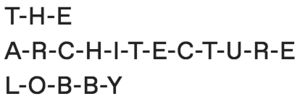June 22–23, 2018
DAY 1: AIA Sessions and Javits Center Politicking
June 22, 2018: 7am–7pm
Jacob Javits Center
Active engagement with relevant sessions at the AIA National convention, ensuring substantive dialogues on professional and infrastructural issues.
Lobby members outside the convention distribute Architecture Lobby information and direct people to the sessions that advance architecture’s value most concretely.
DAY 2: Infrastructure: The Architecture Lobby National Think-In
June 23, 2018: 10am–7pm
Prime Produce, 424 W 54th St, New York, NY 10019
The theme of this Think-In is Infrastructure because 1. it was the issue that our current president vowed to fix; and 2. it parallels the 2018 National AIA convention theme, “Blueprint for Better Cities.”
This Think-In is divided into two parts: Hard Infrastructure and Soft Infrastructure. While Hard Infrastructure engages the material we produce, Soft Infrastructure indicates the institutions by which we produce. The Architecture Lobby aims not only to discuss difficult architectural conditions that do not get proper exposure, but also to provide tools to rebuild relevant infrastructures. It aims to reach some consensus on the articulation of the problems, if not the solutions, and strategies, process, and commitments for spreading this articulation beyond this event.
A Think-In is a series of topical sessions that emphasize debate between varying positions as opposed to speeches and pronouncements. It is an active search for new ways forward in a communal context. Think “radical democracy.”
Five sessions, with introductory remarks/provocations and concluding strategies. Each session begins with a short, 5-minute provocation by each speaker on the polemic at hand. The moderator provokes debate amongst panelist and then with the audience and gathers a summary of key issues, barriers, and critical success factors.
Program:
10-10:45am: Introduction: The Architecture Lobby: Work/Activism (Peggy Deamer)
Hard Infrastructure
10:45am-12pm: Cities and Capital
The city is an instrument of regenerating capital; an interface between citizenship, equity and city building. What role do architects play in conceiving and delivering a city where capital and citizenship stand at increasingly at odds with each other? What might an architectural practice that is in the public interest look like? Do the current channels of deploying capital toward city building foreclose the possibility of mainstreaming alternative modes of architectural practice. Are architects complicit in the production of inequity in the city or are we actors whose agency has been compromised? (Priyanka Shaw, moderator)
Michael Sorkin
Mitch McEwen
Ana Maria Leon
Reinhold Martin
12-12:15pm: Break
12:15-1:30pm: Climate Change
The lack of progress in the reduction of greenhouse gas emissions and adaptation to a radically changing climate is frequently blamed on population growth and the rapid urbanization of developing countries. This fundamentally flawed (and vaguely racist) assessment—which implies the earth’s zero-sum ability to support humanity—needs to be replaced with efforts to allocate resources equitably. But what role should architects and designers have in tackling the climate crisis given that climate change cannot be accomplished solely through the design of “sustainable” buildings? Given that decisions with the highest ecological stakes are made well before an architect becomes involved in the process, what can we do to advance our agency s to affect the underlying systems through which the built environment is realized? How might our practice be re-formed to this end? (Tyler Taylor, moderator)
James Russell
Billy Fleming
Susannah Drake
1:30-2pm: Lunch
Soft Infrastructure
2-3:15pm: Labor
The issues that architectural workers face are increasingly self-evident: long, unpaid hours; marginal profits; no control over schedules; zero job security; no bargaining power with owners. The general understanding that the work we do is somehow not work at all prevents architects, both employers and employees, from understanding and promoting their value. What are the mechanisms for employers to upend this scenario that does not rely on the exploitation of their employees? What are the mechanisms for employees to upend this scenario that does not rely on opening one’s own firm to be one’s own boss? What can architects learn from other creative fields regarding just labor practices? (Dex Walcott, moderator)
Andrew Hersher
Kadambari Baxi
Keefer Dunn
3:15-3:30pm: Break
3:30-4:45pm: #MeToo
After the #MeToo movement (finally) became public in architecture with the accusations against Richard Meier and the widespread circulation of the Shitty Men in Architecture list, we need to take stock of where we are and think systematically about how to move forward. But clearly we need to improve laws and policies to better protect those who report abuse and to make abusers accountable. In addition to this, we need to educate our culture at large to upend the negative backlash visited upon accusers. What can architects do to respond to and/or prevent abusive behavior? How can we organize labor to create a fair and equitable workplace? How do we create broader narratives about architecture, gender, and diversity to overcome the unhelpful binaries that now dominate our efforts? (AL Hu/Elaina Berkowitz, moderators)
Ella Mahony
Andrea Merrett
Julia Murphy
Caroline James
4:45-5pm: Break
5-6:15pm: Alternative Forms of Professional Organization
It is assumed that professional organizations like the AIA are natural and God-given. They are not. Not only are the professional architectural organizations in different nations wildly different, there is a great deal of current theory regarding the validity of professionalism, especially in today’s entrepreneurially-driven economy. What are the advantages of—or even meaning behind—being “professionals”? How best would an organization supporting architectural workers and architecture in general be structured? How can all of the players—architects, contractors, owners/clients, the public—be provided a safe place to negotiate mutual advantages for themselves and society at large? (Quilian Riano, moderator)
Philip Alsopp
Tamar Kisilevitz
Peggy Deamer
6:15-7pm Closing Discussion


